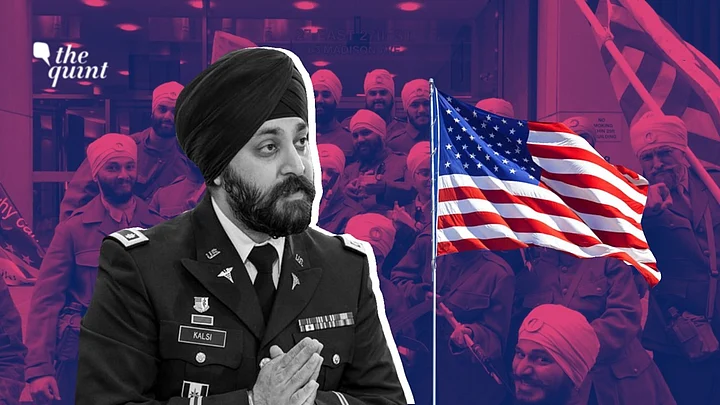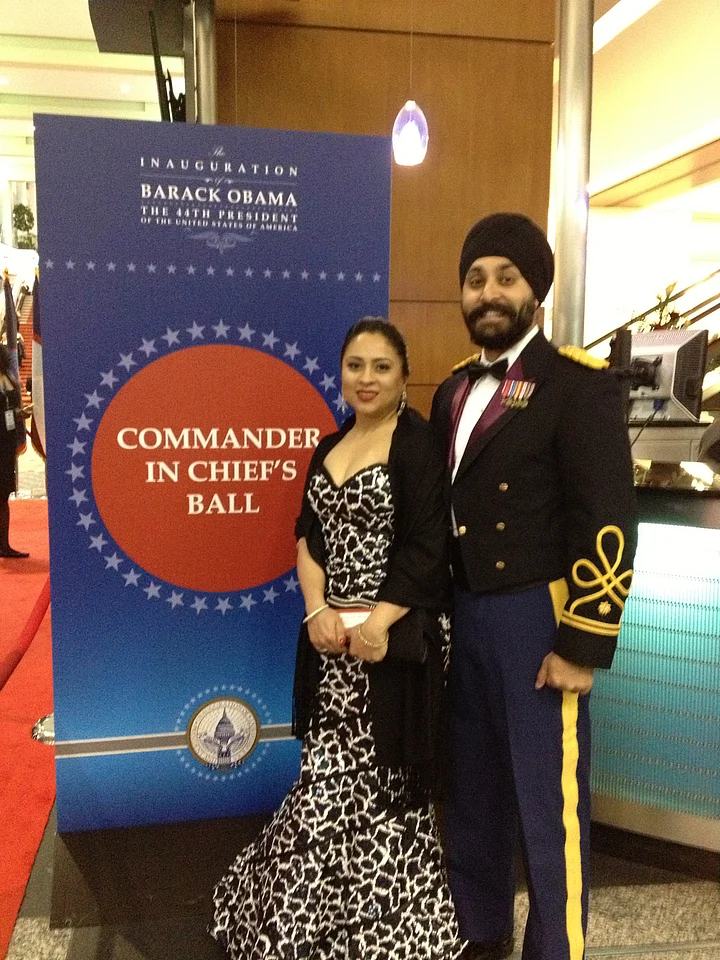"I took care of hundreds of marines who were deployed in Helmand. Not a single marine I patched up during combat operations in Afghanistan bothered that I had a turban or a beard," says Lieutenant Colonel Kamaljeet Singh Kalsi, an emergency medicine specialist, whose army medical unit was tasked with supporting the US Marines as part of one of the largest and most diverse groups, the 44th Medical Brigade in 2011 in Afghanistan.
The first Sikh to be granted permission by the Pentagon to keep his turban, beard, and uncut hair while serving in the US military, Lt Col Kalsi was awarded ‘the Bronze Star for his work’.
'I Never Take No for an Answer'
The Bronze Star Medal is awarded to members of the US Armed Forces for heroic and meritorious service in a combat zone.
With a passion to serve in the army, when Lt Col Kalsi joined the Army's Health Professions Scholarship, he was assured that his unshorn hair and turban will not be a problem. “I took oath in 2001 as an officer. I was in uniform, wearing my turban and beard during training and had no issues,” shares Lt Col Kalsi.
Keen to join active duty in 2008, then Captain Kalsi, decided to fight upon learning that he would not be able to serve with his turban and beard.
“The best way to get Sikhs to do something is to tell them that it can’t be done! I never take no for an answer. It took thousands of hours during that year-and-a-half to get my accommodation, in October 2009. It cost the community over a half a million dollars.“Lt Col Kamaljeet Singh Kalsi
In his battle for change, along with help from other Sikh groups, he was represented by an advocacy group called The Sikh Coalition.
The special exception to serve while wearing the symbols of religious tradition, turned the tide opening doors of the US Military to young Sikh Americans. “We got more and more Sikhs to join,” says Lt Col Kalsi, who founded Sikh American Veterans Alliance (SAVA) to advocate for Sikhs in the military.
For much of the 20th Century, Sikh soldiers in the US Army maintained their articles of faith without issue. During conflicts that required a draft, such as the Vietnam War, there wasn’t a strict grooming standard. However, army officials revised uniform policies in the early 1980s, outlawing beards and head coverings opting for a formal dress code, citing soldiers’ health and safety.
Still No Blanket Permission in US Army for Retaining Articles of Faith
In spite of his victory, the permission to keep articles of faith while serving in the US Army, is not a blanket permission, but is granted on a case by case basis.
SAVA’s efforts have reduced the processing and ushered in the Army’s 2017 permanent religious accommodation policy change after a decades-long effort.
“It has become routine now. Mine took tremendous paper work to go through a lot of red tape. Now it takes about a month. We have a good working relationship with the army; and with repetition, we forced them to become efficient.”Lt Col Kamaljeet Singh Kalsi
What Inspired Lt Col Kalsi to Battle it Out
The inspiration to fight for his right to be able to fight for his country came from the battles Lt Col Kalsi’s family has fought. He is the fourth generation of a family with a tradition of military service, with his great-grandfather having served in the British Army, and his grandfather and father in the Indian Air Force.
His grandparents left Lahore for Kanpur during partition. Born at the Kanpur Air Force Hospital, little Kamal Kalsi arrived in the US when he was two. The emergency room physician now lives in New Jersey with his parents, wife, and two teenage children.
- 01/02
Lt Col Kalsi with his wife.
(Photo: Accessed by The Quint)
- 02/02
Lt Col Kalsi with his family.
(Photo: Accessed by The Quint)
The soldier remembers his electronics engineer father’s fight against the NY Transit Authority.
“My father had to take exams to qualify for city jobs. He had one of the highest scores on one – 99.9 percentile. But when he showed up for the job he was told he will have to wear a hard hat and remove his turban. He said – ‘I can wear a smaller turban and wear a hard hat on top’. But that wasn’t good enough for them. He lost in the court. As the de facto case that everybody referred to, that became the standard for religious freedom,” shares Lt Col Kalsi, continuing:
”When the same happened to me, I thought back to that moment when my father was denied religious freedom. I decided whether I win or lose, I have to stand up for myself.”Lt Col Kamaljeet Singh Kalsi
The Case of Marine Corps, First Lieutenant Sukhbir Singh Toor & Two Other Marines
Lt Col Kalsi, who is now an Army reserve, points out functional differences between the various military branches: “Religious accommodations for Sikhs are approved for the US Army by their local commands. For the Air Force, permissions come from the United States Air Force at the Pentagon. But the Navy, Marines, and Coast Guard don’t have a policy in place.”
The theme of choosing between a turban and beard or a career, has come to the fore again with media attention on First Lieutenant Sukhbir Singh Toor, an active duty officer in the US Marine Corps since 2017. When recruited, he gave up his beard and cut his hair as he thought he had no choice.
The Sikh Coalition, representing 1st Lt Toor mentions on its website, “After several rounds of appeals, in August, the Department of the Navy granted a limited accommodation which imposed unacceptable restrictions on 1st Lt Toor’s religious rights–including that he would be forced to shave his beard when deployed.”
1st Lt Toor says on The Sikh Coalition site, “For more than three years, I have proven my commitment to excelling in the U.S. Marine Corps and defending my country. Now, with the direct support of The Sikh Coalition, I am seeking a full and complete religious accommodation that will allow my turban and beard so that I can stay true to my faith while continuing my career of service.”
If the USMC grants 1st Lt Toor a full accommodation, it would be the first for an active duty Sikh Marine.
Lt Col Kalsi, whose organisation SAVA works with The Sikh Coalition for changing policies in the US Marine Corps and the US Navy, believes that in the case of 1st Lt Toor, “The lawsuit that potentially might follow can take years.”
Along with helping a fresh high school graduate recruit in the US Marine Corps, SAVA is supporting another officer who is already serving as a Marine.
“We have two Marines who are in the same boat as 1st Lt Toor. We are helping them with paper work. We will negotiate a better accommodation if it‘s restrictive. One of the nation's largest law firms is legal counsel for SAVA, and if need be we are happy to pursue a legal remedy.”Lt Col Kamaljeet Singh Kalsi
Lt Col Kalsi calls the US Marine Corps a ‘conservative branch – one of the last services to allow African Americans and women in their ranks – not on the cutting edge of diversity and inclusion’. He adds,” Functionally, there is not much difference between what Army soldiers and Marines do. We are in the same battles together, with the same essential dangers, and safety requirements.”
- 01/05
Lt Col Kalsi with US Marines at Combat Support Hospital at Camp Dwyer in Helmand province in Afghanistan.
(Photo: Accessed by The Quint)
- 02/05
Lt Col Kalsi with US Marines at Combat Support Hospital at Camp Dwyer in Helmand Province in Afghanistan.
(Photo: Accessed by The Quint)
- 03/05
Lt Col Kalsi with US Marines at Camp Dwyer in Helmand province in Afghanistan.
(Photo: Accessed by The Quint)
- 04/05
Lt Col Kalsi with US Marines at Camp Dwyer in Helmand province in Afghanistan.
(Photo: Accessed by The Quint)
- 05/05
Lt Col Kalsi with US Marines at Camp Dwyer in Helmand province in Afghanistan.
(Photo: Accessed by The Quint)
Beards & Turbans in Hazardous Gas Situations
In tests run by the US Defence establishment, it has been observed that beards and turbans create concern for soldiers’ safety in hazardous gas situations.
But Lt Col Kalsi disagrees.
”I was a part of those studies as an observer. Whenever myself and other Sikhs have gone through standard testing in a chamber with an irritant gas, none of us had an issue with establishing a seal with a protective mask. A study done at a secret research facility at a military base says in some cases a seal wasn’t established due to the beard. But the military has masks that work with beards, which are in use, and are readily available.”Lt Col Kamaljeet Singh Kalsi
How Important Is Uniform When It Comes to the Ability to Serve?
Advocacy and legal action has ensured that nearly 100 Sikhs are able to serve in the US Armed Forces keeping their articles of faith. Sikh Americans are proud of their valour and long warrior tradition.
“Historically Sikhs have fought with beards and turbans. During WW2 the Nazis called us the black lions. If 80,000 Sikhs could bleed and die in WW2, how can we in US not find a way to accommodate them,” asks Lt Col Kalsi.
Sikh soldiers and their supporters are credited by Jews, Muslims, etc, in the US for updating military uniform rules.
But how important is uniform when it comes to the ability to serve?
Having established himself a significant voice for the rights of Sikhs in the US military, the patriotic Sikh American Lt Col Kalsi reminisces a moment from a combat zone in Afghanistan, when a colleague he was deployed with referred to the USA flag on his uniform: ”I don’t even see the turban and beard any more, I only see the flag on your shoulder.”
And for that flag, Lt Col Kalsi wishes for the ‘US military at large to reflect the people it serves and defends’.
(Savita Patel is a senior journalist and producer, who produced ‘Worldview India’, a weekly international affairs show, and produced ‘Across Seven Seas’, a diaspora show, both with World Report, aired on DD. She has also covered stories for Voice of America TV from California. She’s currently based in the San Francisco Bay Area. She tweets @SsavitaPatel.)







